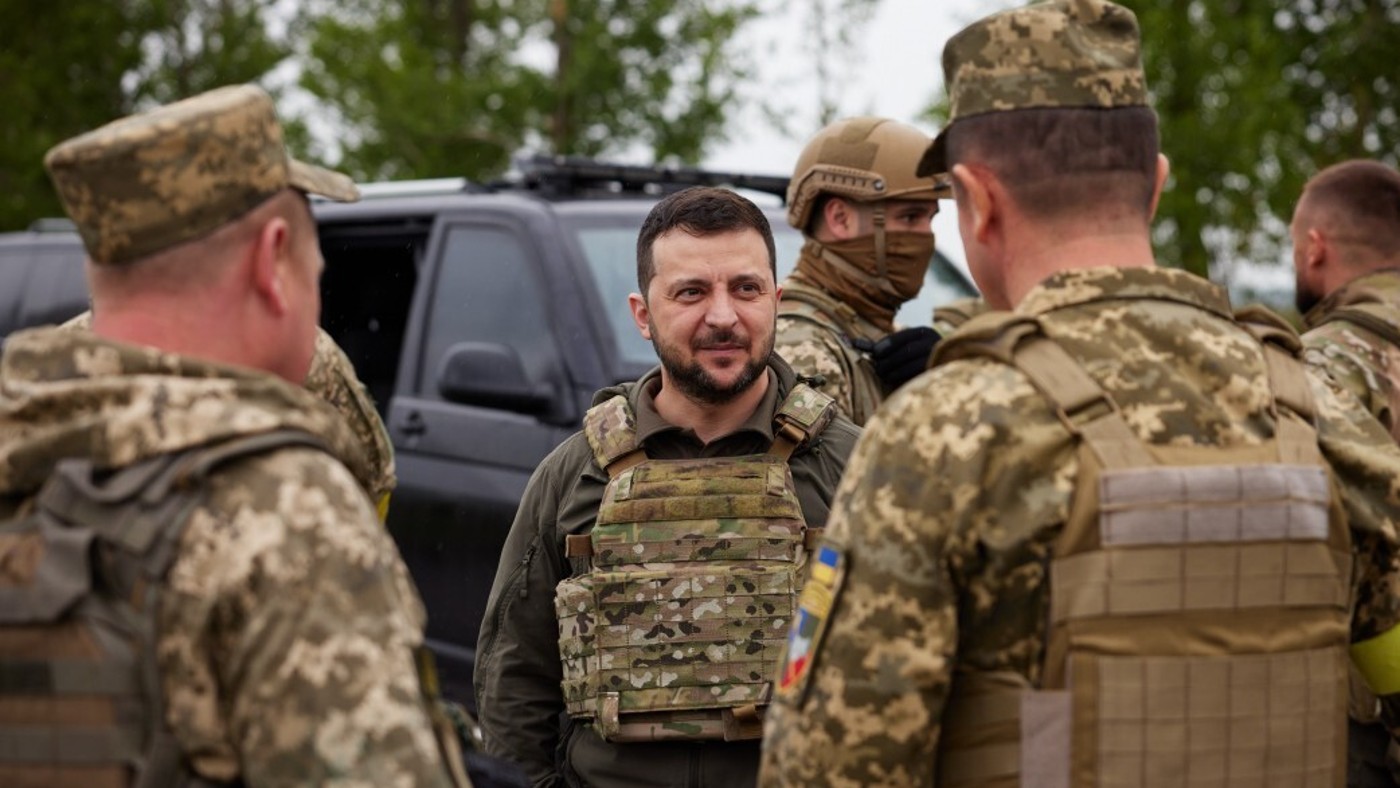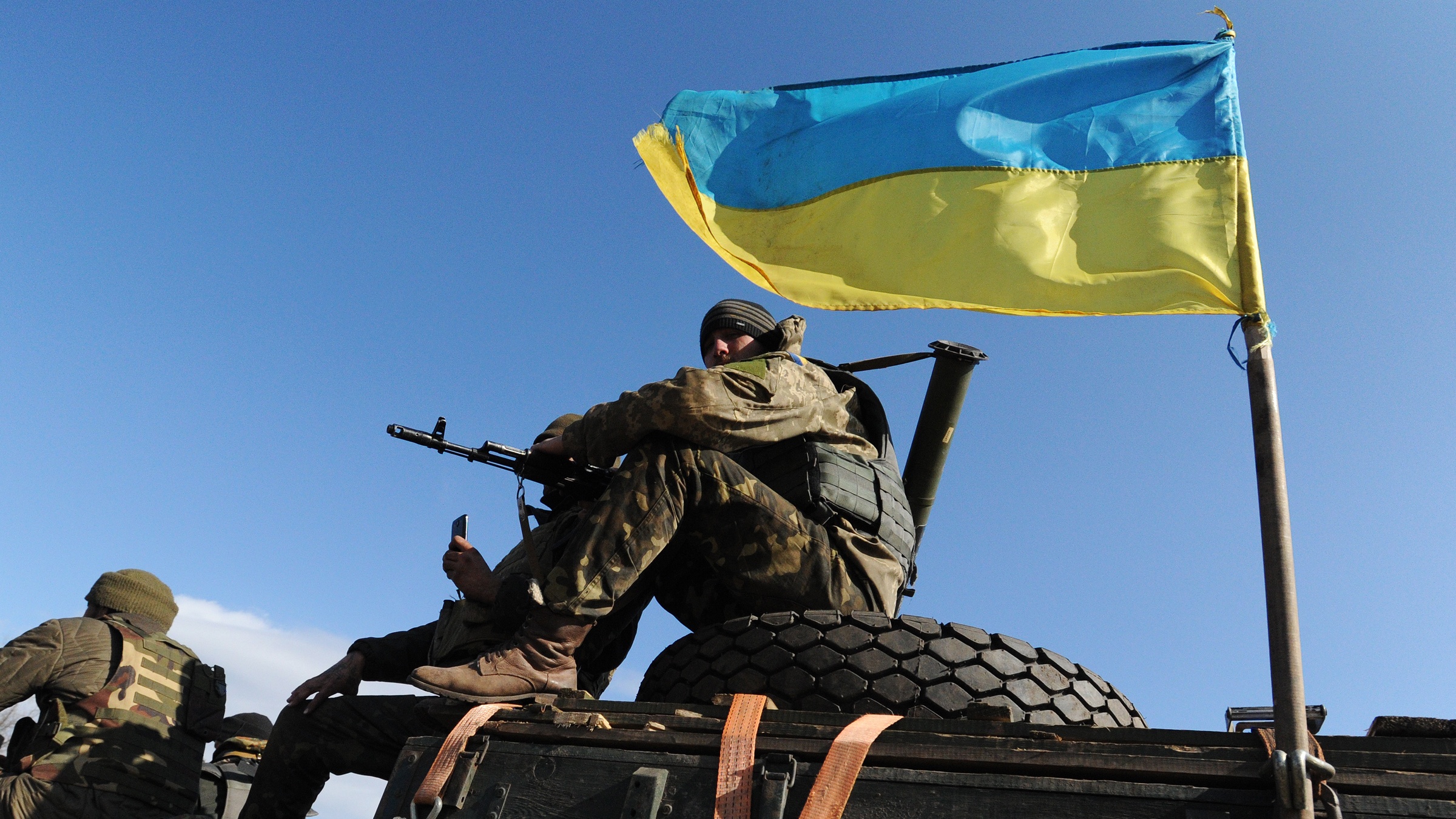Is the Ukraine war descending into a ‘frozen conflict’?
As heavy fighting in Donbas continues, neither side is making clear gains

A free daily email with the biggest news stories of the day – and the best features from TheWeek.com
You are now subscribed
Your newsletter sign-up was successful
Russia launched its first air strikes on Kyiv in over a month, while heavy fighting continued in eastern Ukraine this week. The strikes on sites in Ukraine’s capital followed warnings from Moscow that it would step up attacks in retaliation for the supply of new US weapons to Ukraine.
Kyiv said its forces had recaptured a fifth of Severodonetsk, a Russian-occupied city in the eastern Luhansk province. After a visit to the front line, Ukraine’s President Zelenskyy warned that his forces were outnumbered in Severodonetsk and nearby Lysychansk, but said they had “every chance” of fighting back. Russia will control the whole of Luhansk if it takes the cities. The US announced that it would send a new rocket system, doubling Ukraine’s artillery range; the UK will send similar weapons. In remarks which angered Kyiv, France’s President Macron urged the West not to “humiliate” Russia, so that a diplomatic solution can be found “when the fighting stops”.
What the editorials said
What on earth is Macron thinking, asked The Times. Russian forces are launching “relentless attacks” on Severodonetsk and are killing up to 100 Ukrainian troops a day. Yet instead of focusing on getting weapons to Ukraine, the French president has made an “extraordinarily foolish” intervention in which he talked of finding an accommodation with Moscow. And he isn’t the only EU leader to suggest that Russia be offered a face-saving way out of the war: Germany’s Olaf Scholz has done so too, and recently repeatedly refused to say that he wants to see Russia defeated militarily.
The Week
Escape your echo chamber. Get the facts behind the news, plus analysis from multiple perspectives.

Sign up for The Week's Free Newsletters
From our morning news briefing to a weekly Good News Newsletter, get the best of The Week delivered directly to your inbox.
From our morning news briefing to a weekly Good News Newsletter, get the best of The Week delivered directly to your inbox.
Signs of “flagging resolve” in Western capitals are clearly alarming, said The Washington Post – not least because Russian forces seem to have “regrouped” in recent weeks. Yet for all the talk of “intra-European squabbling”, said The Economist, the overall story of this conflict is one of impressive continental unity: witness the EU’s announcement of stiffer sanctions on Russia last week. However, that unity will no doubt be “further tested” in the months ahead – especially by the question of how to wean the continent off Russian gas.

What the commentators said
Much has been made of Russia’s advances in recent weeks, said Max Boot in The Washington Post, but “the facts on the ground” suggest that Ukraine’s position is still pretty strong. True, Russian forces have made “incremental gains” in the east. But they haven’t come close to encircling Ukrainian troops, who are retaking parts of Severodonetsk, a city which had looked lost a week ago. Meanwhile, the West continues to bolster Kyiv’s arsenal. Russian forces, by contrast, are suffering from “incompetent leadership and low morale”, and have lost so much hardware that they’re using 60-year-old tanks. The West must now go for broke, said Anne Applebaum in The Atlantic. Far from offering Putin an “off-ramp”, it should aim for the “rapid defeat, or even, to borrow Macron’s phrase, humiliation” of Russia. Putin has shown no appetite for ending his war, and views destroying Ukraine as an “existential goal”. If we’re to prevent further aggression (by him), only Russia’s total defeat will suffice.
Alas, that sort of talk belongs in the realm of “fantasy”, said Robert Colls in The New Statesman. Leaving aside the threat of nuclear escalation, do hawks in the West really think Russian forces will simply “crawl away” while Zelenskyy stages a “victory parade in Kyiv”? No, the “miserable truth” is that neither side can afford to lose this war. If it is to end, Putin “has got to be shown a way down” so that a diplomatic solution can be found – however unpalatable that sounds. For now, the war in Donbas is like a “bloody seesaw”, said Daniel DePetris in The Spectator. “The Russians spend a day acquiring one kilometre of ground, only for the Ukrainians to counter attack shortly thereafter.” Neither side looks likely to end the stalemate soon, and both appear to view diplomacy as “a chore best left to some later date”. The most likely scenario is therefore that the war descends into a “frozen conflict”, like the one in Donbas from 2014 until February. That’s by no means a good outcome – but right now, it’s “looking like the best of bad options”.
What next?
The foreign ministers of Russia and Turkey met in Ankara this week to discuss opening a corridor in the Black Sea for agricultural exports, following warnings that Russia’s naval blockade could trigger global food shortages. Kyiv says that 75 million tonnes of grain could be stuck in Ukraine by autumn unless exports resume.
A free daily email with the biggest news stories of the day – and the best features from TheWeek.com
More than 1,000 Ukrainian fighters who surrendered after the fall of Mariupol have been transferred to Russia for investigation, according to Russian state media. There have been calls in Russia to treat them as war criminals.
-
 Political cartoons for February 15
Political cartoons for February 15Cartoons Sunday's political cartoons include political ventriloquism, Europe in the middle, and more
-
 The broken water companies failing England and Wales
The broken water companies failing England and WalesExplainer With rising bills, deteriorating river health and a lack of investment, regulators face an uphill battle to stabilise the industry
-
 A thrilling foodie city in northern Japan
A thrilling foodie city in northern JapanThe Week Recommends The food scene here is ‘unspoilt’ and ‘fun’
-
 What would a UK deployment to Ukraine look like?
What would a UK deployment to Ukraine look like?Today's Big Question Security agreement commits British and French forces in event of ceasefire
-
 Would Europe defend Greenland from US aggression?
Would Europe defend Greenland from US aggression?Today’s Big Question ‘Mildness’ of EU pushback against Trump provocation ‘illustrates the bind Europe finds itself in’
-
 Is conscription the answer to Europe’s security woes?
Is conscription the answer to Europe’s security woes?Today's Big Question How best to boost troop numbers to deal with Russian threat is ‘prompting fierce and soul-searching debates’
-
 Trump peace deal: an offer Zelenskyy can’t refuse?
Trump peace deal: an offer Zelenskyy can’t refuse?Today’s Big Question ‘Unpalatable’ US plan may strengthen embattled Ukrainian president at home
-
 The Baltic ‘bog belt’ plan to protect Europe from Russia
The Baltic ‘bog belt’ plan to protect Europe from RussiaUnder the Radar Reviving lost wetland on Nato’s eastern flank would fuse ‘two European priorities that increasingly compete for attention and funding: defence and climate’
-
 How should Nato respond to Putin’s incursions?
How should Nato respond to Putin’s incursions?Today’s big question Russia has breached Nato airspace regularly this month, and nations are primed to respond
-
 Russia’s war games and the threat to Nato
Russia’s war games and the threat to NatoIn depth Incursion into Poland and Zapad 2025 exercises seen as a test for Europe
-
 What will bring Vladimir Putin to the negotiating table?
What will bring Vladimir Putin to the negotiating table?Today’s Big Question With diplomatic efforts stalling, the US and EU turn again to sanctions as Russian drone strikes on Poland risk dramatically escalating conflict